Here’s a flowchart to drill home the message:
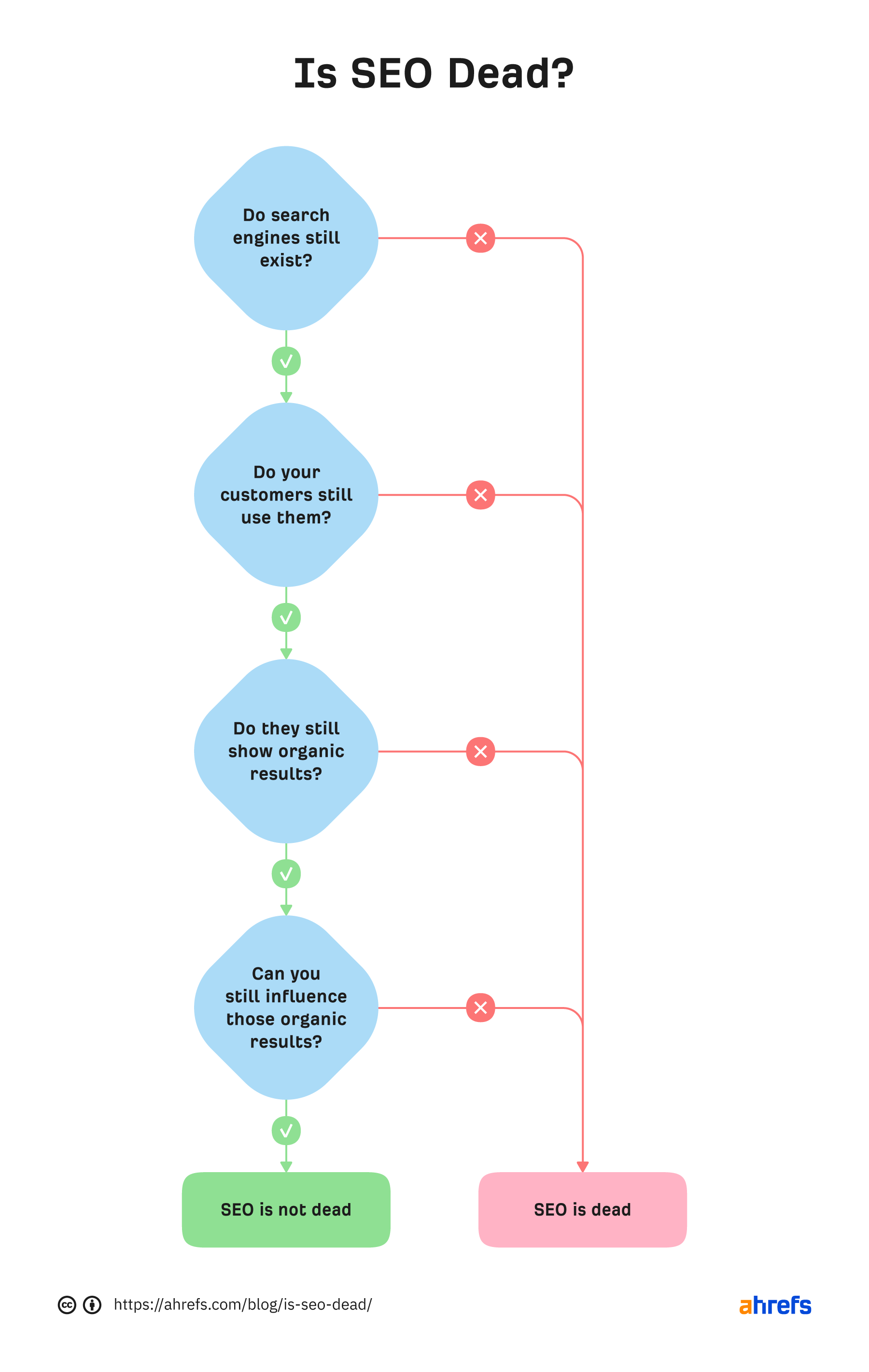
So… why do people keep saying it is?
Let’s discuss.
People often say that SEO is dead because they find it increasingly difficult to rank the kind of content they want for high-volume terms.
For example, say you sell air fryers. You’d probably love to rank your product or category page for a term like “air fryer,” right?
If we use Ahrefs’ Keywords Explorer to see how the SERP for “air fryer” looked in 2015, it’s clear that this used to be possible. All the top results were individual product pages.
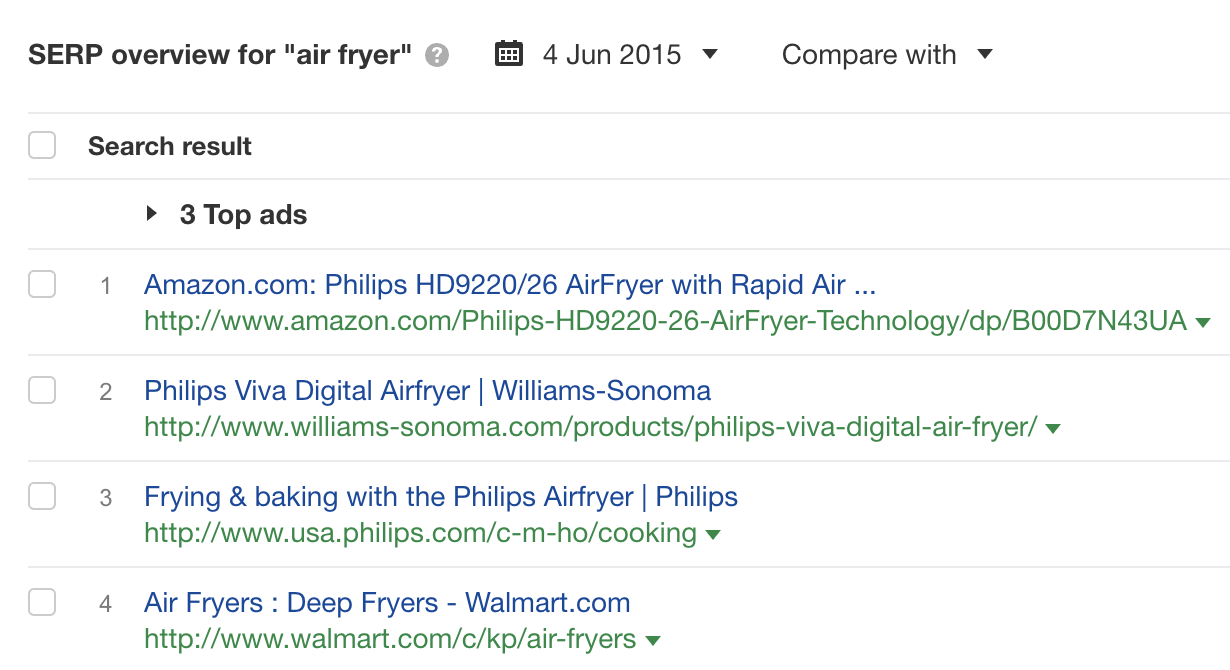
But if we look at today’s SERP, it’s a different story. Besides a product category page from Amazon, all results are blog posts listing top picks.
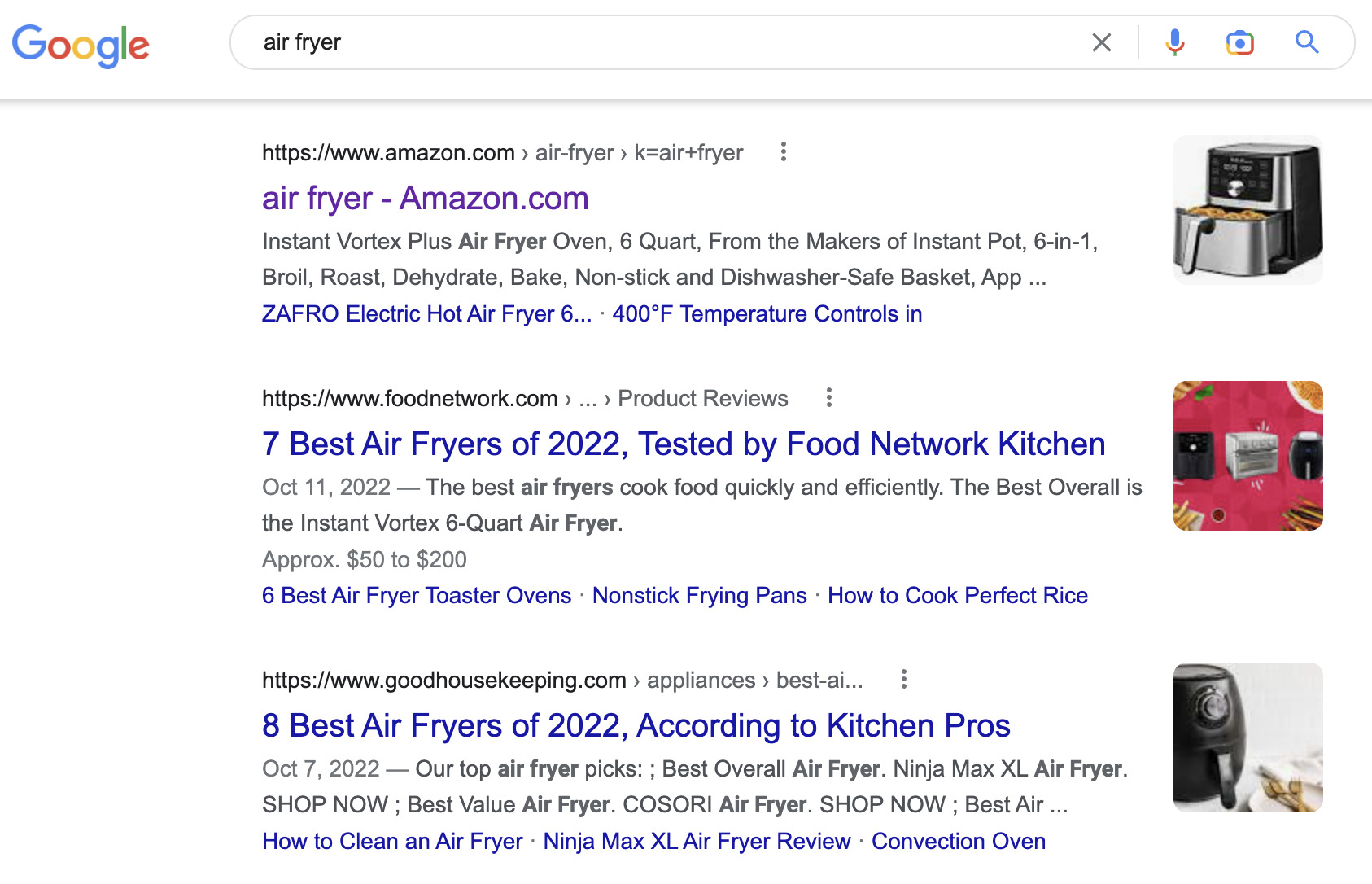
Why did this happen?
It may be that intent has changed over the years. But I think it’s more likely that Google has got better at understanding search intent.
Either way, it’s clear that folks searching for terms like “air fryer” now want to see product recommendations, not individual products. So this is what Google ranks.
Does this mean that SEO is dead?
No. It’s just harder. You need to focus more on aligning content with search intent than ever before to succeed in SEO.
For example, if you want to rank for “air fryer,” you’ll probably find it easier to rank a blog post listing top picks than a product or category page. If you want to rank for “stainless steel air fryer,” a product category page is probably the way to go.
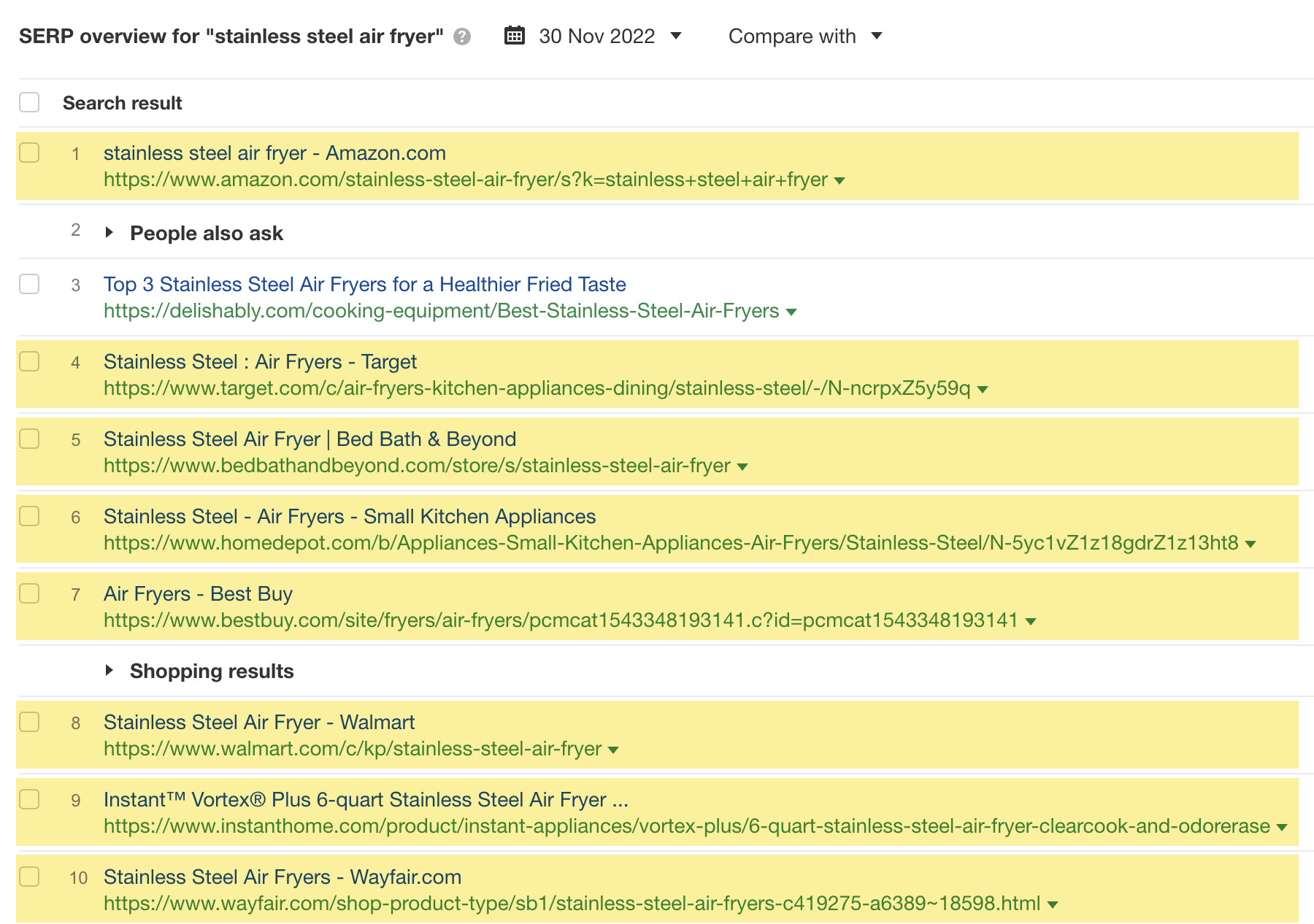
Learn more: Searcher Intent: The Overlooked ‘Ranking Factor’ You Should Be Optimizing For
People also often say that SEO is dead because it’s getting harder to rank in particular niches.
For example, here’s a niche health site’s estimated organic traffic over the last few years:

You can see that traffic fell off a cliff in 2018. The site went from an estimated 240K monthly search visits to virtually zero.
This isn’t an isolated case either. Many niche site owners have seen Google decimate traffic to their most lucrative niche sites in recent years.
Why did this happen?
In some niches, the reason is simple: There’s more competition than ever before. But in others, it’s largely because Google has been doubling down on the importance of E-A-T.
If you’re unfamiliar with E-A-T, it stands for expertise, authoritativeness, and trustworthiness. It’s a concept from Google’s Search Quality Rater Guidelines, which help human quality raters assess the quality of Google’s search results.
It’s so important that it’s mentioned 130 times in the document.

Crucially, however, E-A-T is most important when it comes to “Your Money or Your Life (YMYL)” topics. Google describes these as those that “could significantly impact the health, financial stability, or safety of people, or the welfare or well-being of society.”
In other words, the topics that make up some of the most lucrative niches.
As a result, it’s now near impossible for the little folks to rank for YMYL topics. YMYL SERP domination is now almost entirely a game for big brands and government organizations.
Just take a look at the results for “high blood pressure symptoms”:
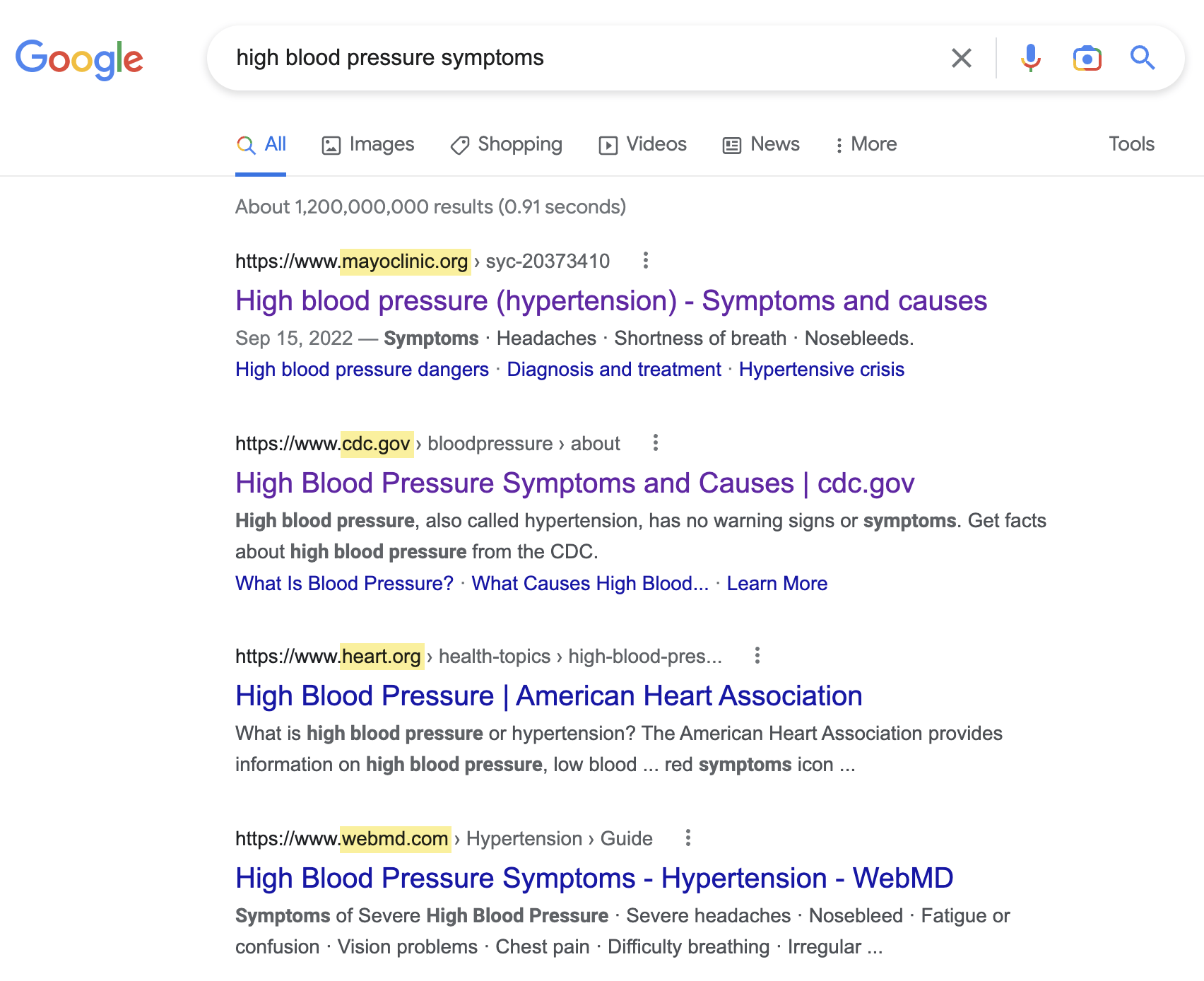
Every single one is written by a doctor and comes from a government body or non-profit organization. There’s virtually no chance a solo blogger with no formal medical expertise can rank here.
It’s not just “hardcore” medical topics where this is the case either.
Back in 2012, I ranked #1 for “best protein powder” with a mediocre article on a brand-new blog. It only takes one look at today’s brand-dominated SERP to realize this won’t happen now, as all the top-ranking results are from well-known sites.
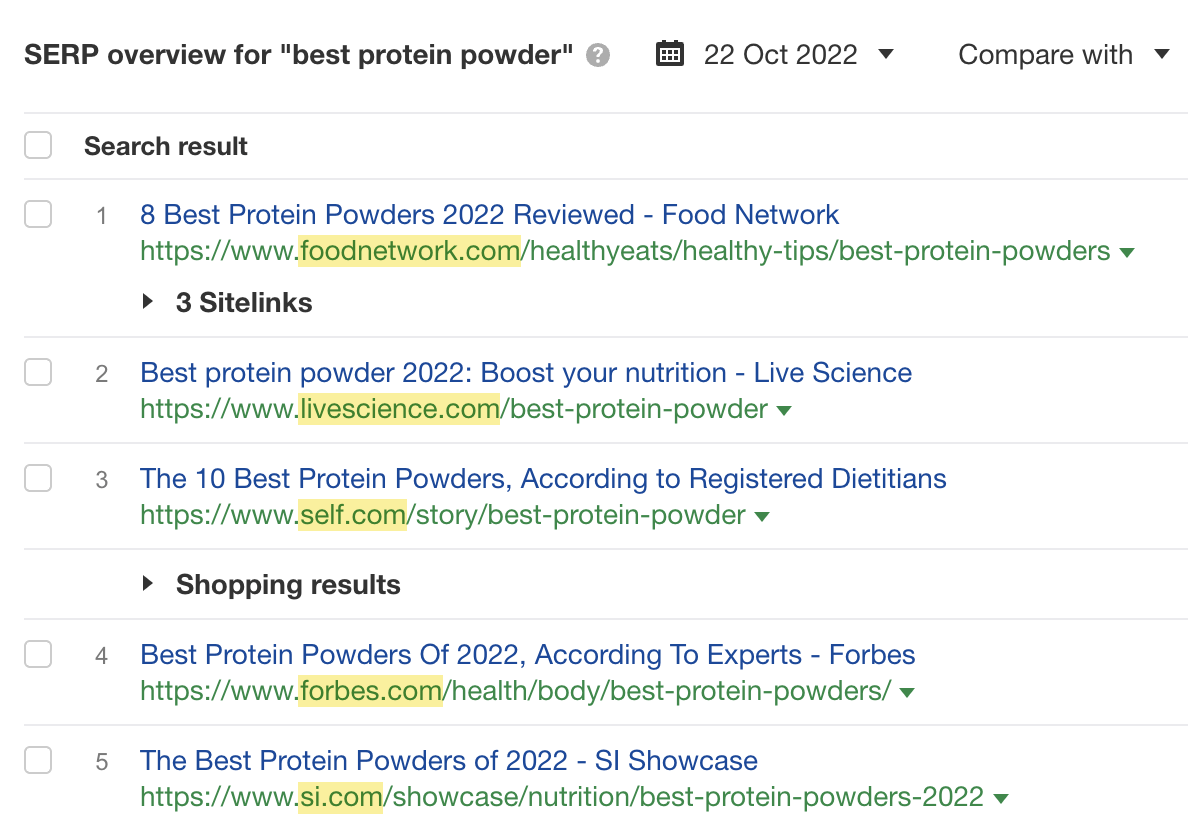
Does this mean that SEO is dead?
No. It’s just harder. If you want to rank for lucrative YMYL topics, you need E-A-T.
Of course, there’s some debate in the SEO industry about precisely what this means. In fact, Google’s Gary Illyes is on record saying that E-A-T is largely based on links and mentions on authoritative sites.
That may be true, but consider how sites attract such links and mentions in the first place.
For example, if you’re trying to rank for a lucrative medical term like “best diet pills,” you’re unlikely to attract links and mentions from “authoritative” sites unless your content is written or reviewed by a doctor. Hence the importance of “expertise.”
As this content is costly and requires more effort, ranking in these niches is undoubtedly much more challenging and costly than it used to be.
Learn more: What Is E-A-T? Why It’s Important for SEO
People sometimes claim that SEO is dead because the SEO techniques that used to work no longer do.
This is true. Take my earlier example of ranking for “best protein powder.” In 2012, all it took was a few mediocre guest posts to rank #1. I also managed to rank that same site for a lucrative affiliate keyword by asking a friend for a link from The Huffington Post.

It’d be much harder to game the system and rank these days.
Why did this happen?
Google has got better at spotting the techniques used to manipulate the SERPs. In other words, it (often) knows when your links are bought, your content has no unique value, or your UX is trash. This makes them less trivial to rank than before.
Here’s Google’s John Mueller pointing out that this is how it should be on Twitter:
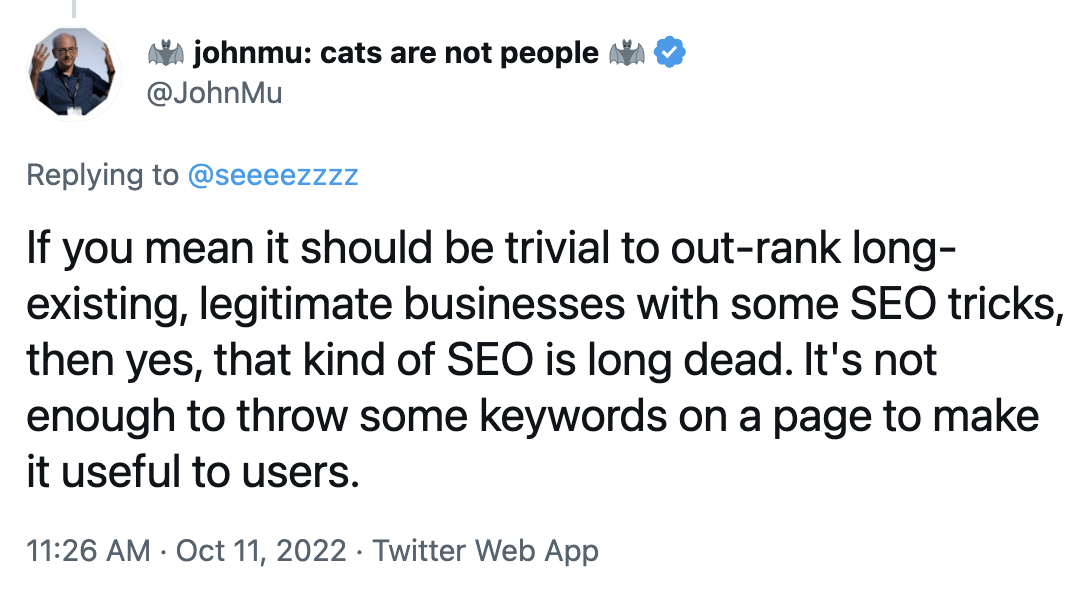
Does this mean that SEO is dead?
No. It’s just harder. If you want to rank in Google these days, your content had better deserve to rank. And you had better be willing to jump through some hoops to prove to Google that’s the case too.
You need to:
- Earn high-quality backlinks, not just pay for low-quality ones.
- Craft unique content, not just rehash what the top-ranking results say.
- Provide a good user experience, not just throw up any old site.
Learn more: How to Rank Higher on Google
People claim that Google is killing SEO by stealing clicks with direct answers on the SERP.
For example, take a look at the SERP for “who played russ on friends”:
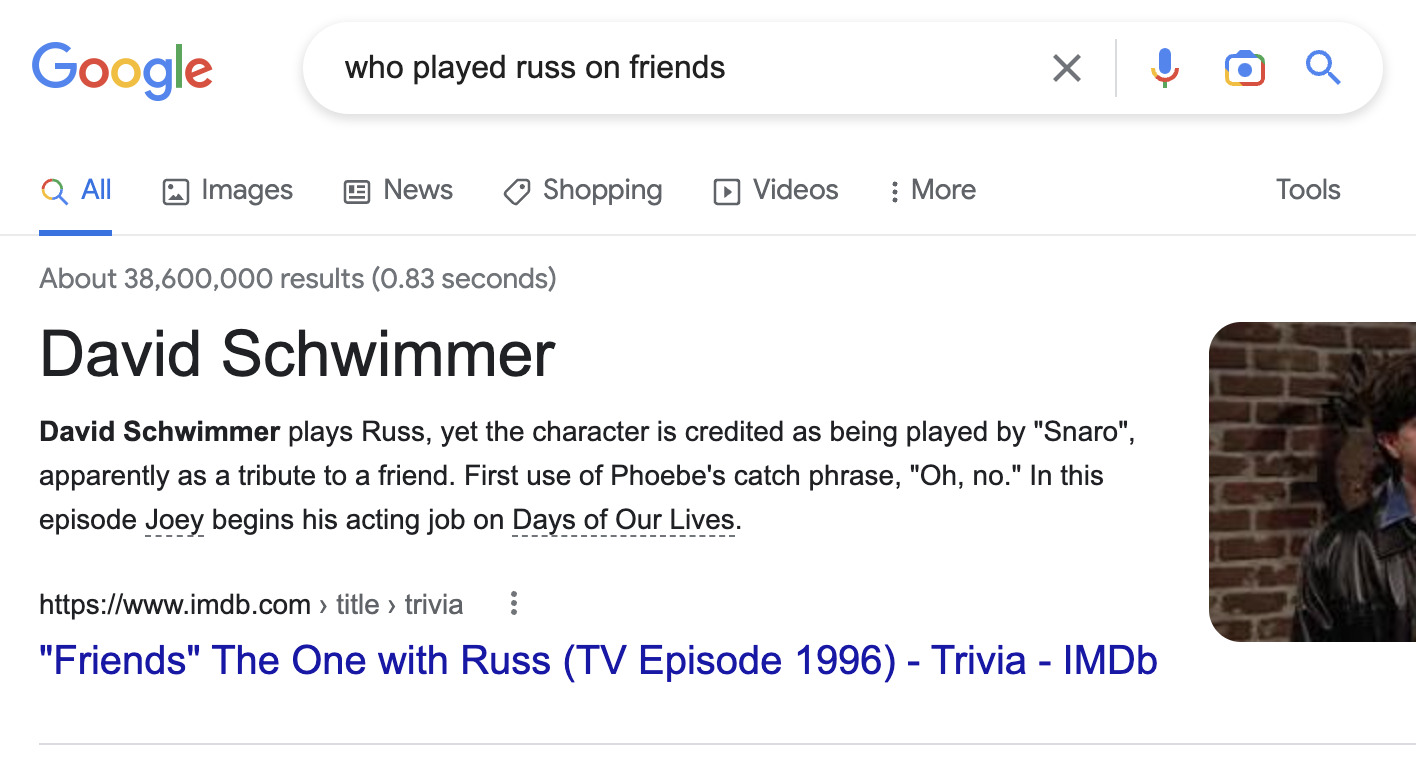
Given that the answer is right there, it’s fair to assume that most users won’t bother clicking.
Data from Ahrefs’ Keywords Explorer backs this up. Despite an estimated 1.2K searches per month in the U.S., we estimate that there are only 0.35 clicks per search on average.
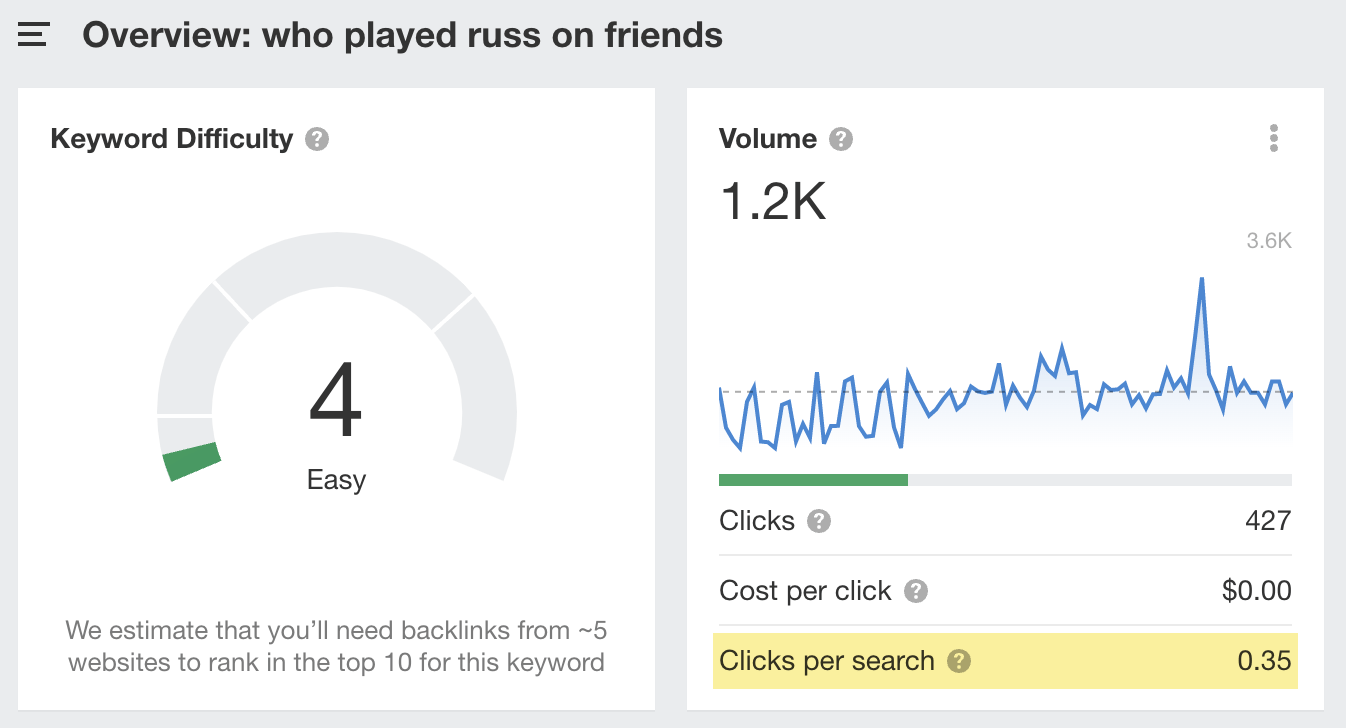
This isn’t an isolated example either. According to 2020 data from SparkToro, 64.82% of Google searches end without a click to any web property in the search results.
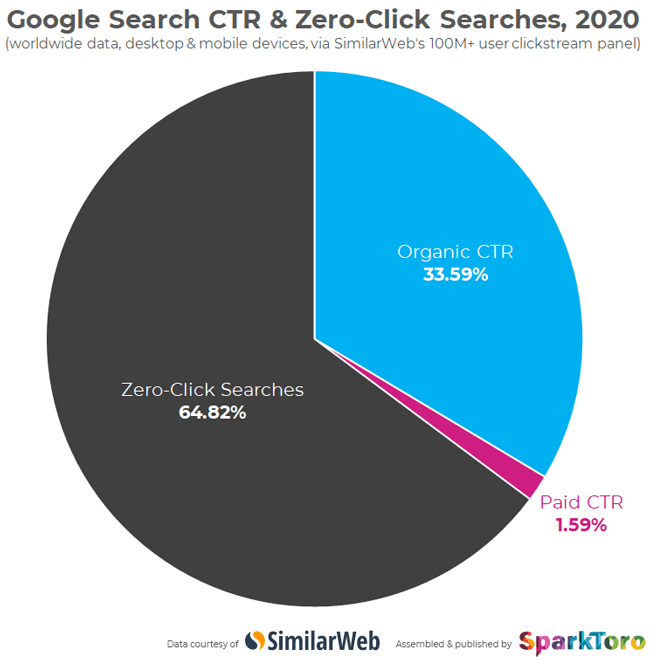
Why did this happen?
Google is more useful for users when it provides answers directly on the SERP. It’s as simple as that, really.
Does this mean that SEO is dead?
No. You just need to prioritize keywords that can’t easily be answered on the SERPs if you want organic clicks.
For example, Google answers “how do search engines work” on the SERP as it does for “who played russ on friends.” But do you understand how search engines work from that short paragraph, or would you need to click?
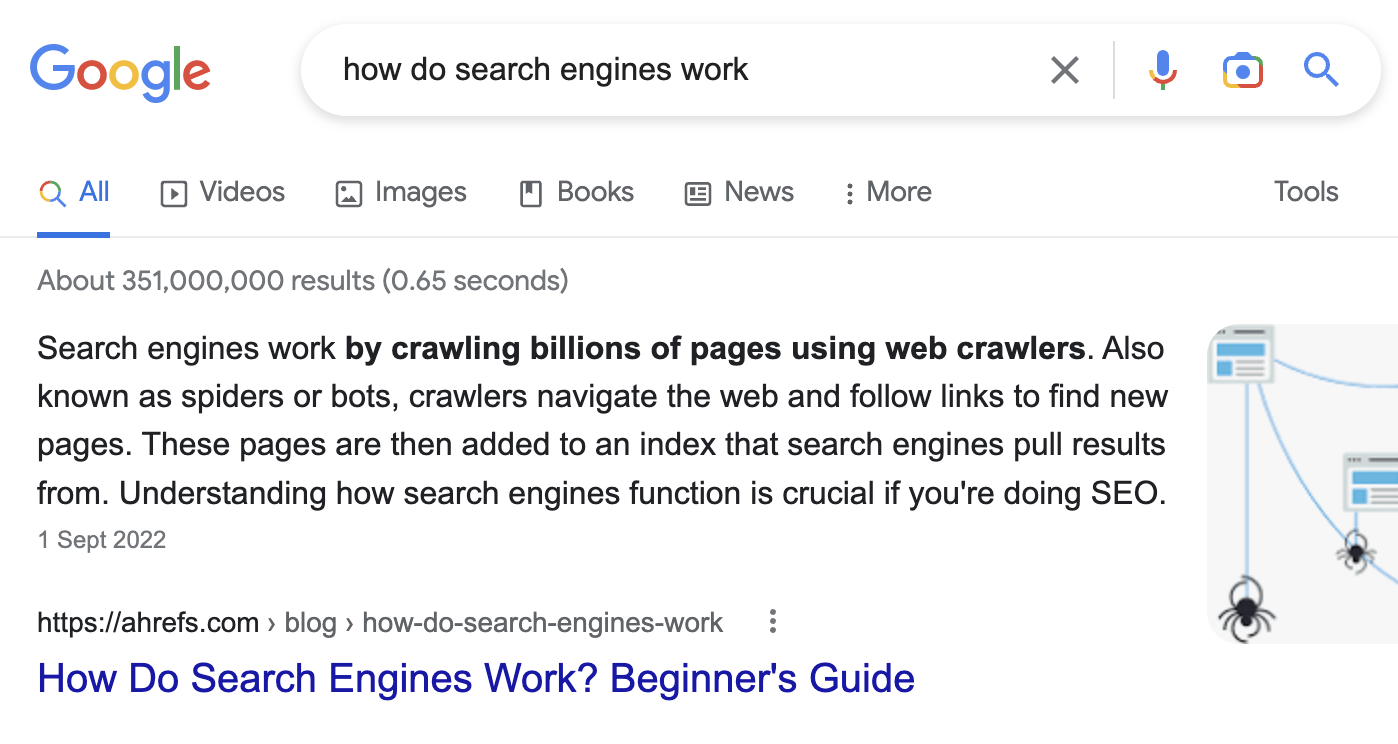
Judging by the data in Keywords Explorer, it’s the latter. There are 0.84 clicks per search on average.
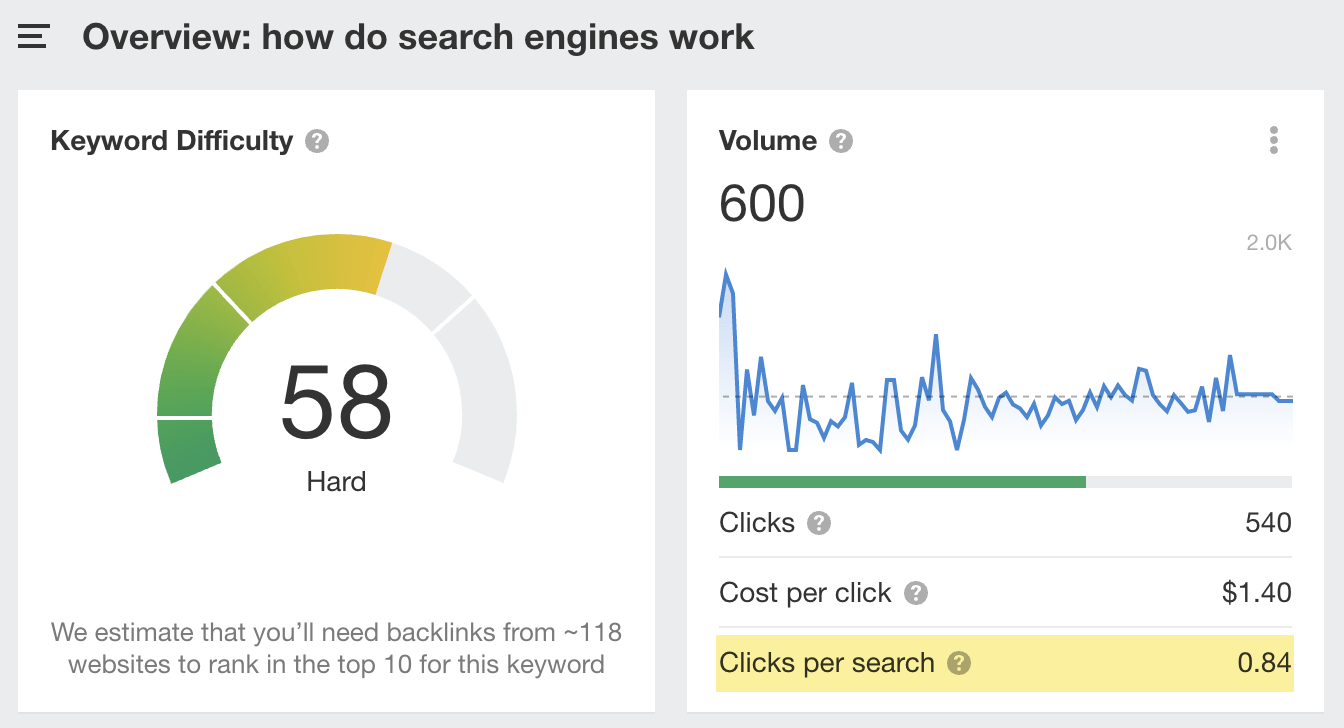
This is because it’s hard to understand how search engines work in just a few sentences. It’s a complex topic that needs further explanation. As a result, keywords like this are somewhat immune to Google’s efforts to be an answer engine.
That said, it’s worth noting that some SERP features, like featured snippets, can actually be seen as an opportunity. This is because Google usually pulls the snippet from a top 10 result, so you can often shortcut your way to the top of the SERP by winning the featured snippet.
Here’s a quick way to find low-hanging featured snippet opportunities on your website:
- Enter your domain into Site Explorer
- Go to the Organic keywords report
- Filter for keyword rankings in positions #1-10
- Filter for featured snippets where the target doesn’t rank
This will show your site’s first-page rankings where there’s a featured snippet you don’t own.
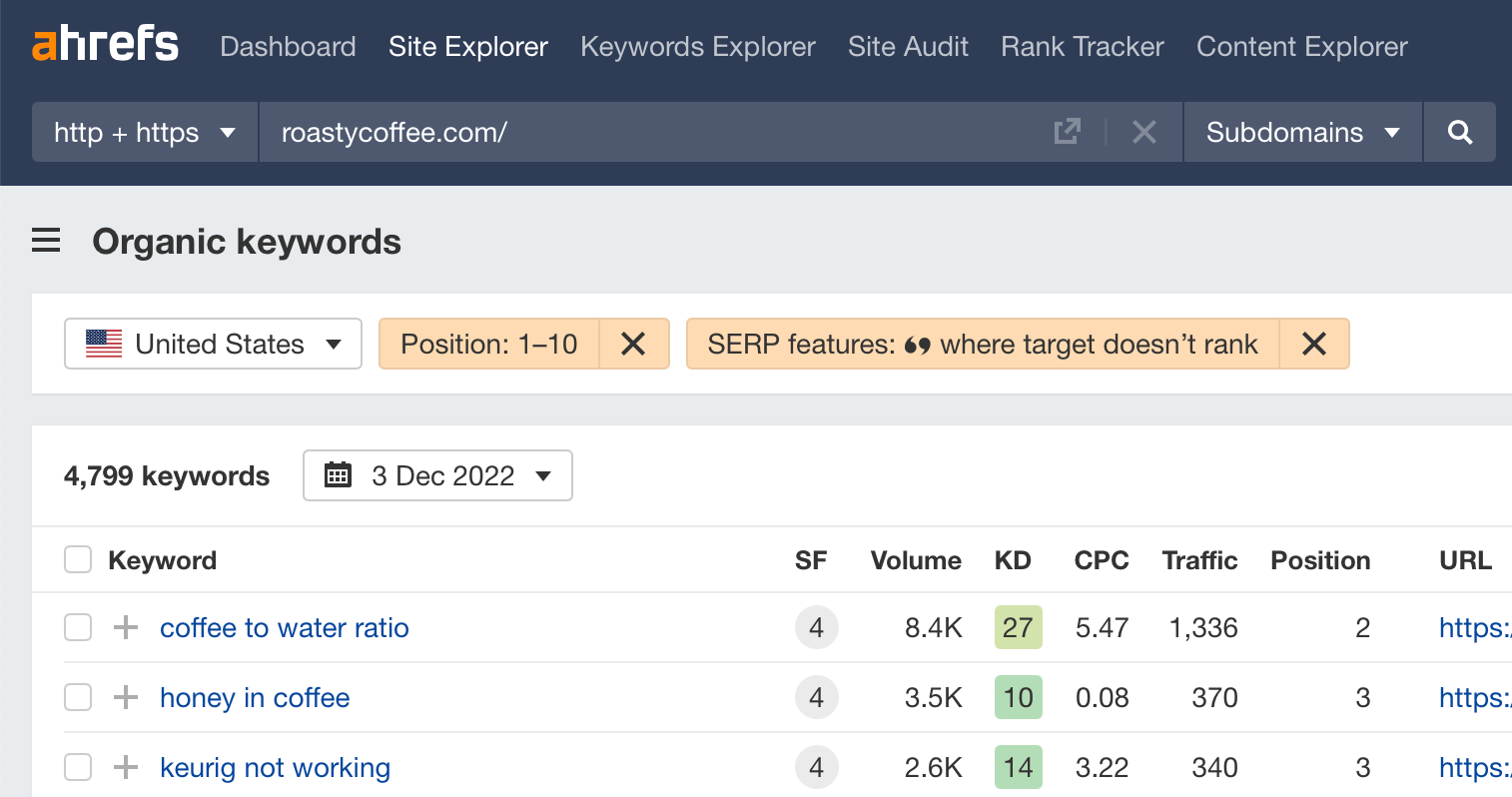
Nobody knows exactly how Google chooses the featured snippet. Your best bet is to review the existing snippet and try to answer the query more eloquently on your page (in an equally concise way).
Given that you want clicks, it might seem counterintuitive to do this. But you’re probably going to get more clicks from ranking #1 in the featured snippet than #8 as a “blue link” result.
Learn more: How to Optimize for Google’s Featured Snippets
Final thoughts
SEO is still alive because people are still using search engines with organic results that you can influence with SEO. It’s just harder than before for the reasons stated above.
However, this isn’t necessarily a bad thing. It just means you need to pick your battles more wisely and keep your finger on the pulse to understand what does and doesn’t work going forward.
Got questions? Ping me on Twitter.



